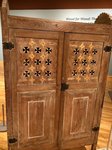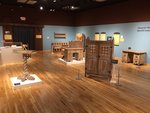Wind: 10.4 mph, N
Welcome to our new web site!
To give our readers a chance to experience all that our new website has to offer, we have made all content freely avaiable, through October 1, 2018.
During this time, print and digital subscribers will not need to log in to view our stories or e-editions.


Sept. 2 through Oct. 3, "Wood for Wood: The WPA and Spanish Colonial Style Furniture," exhibit examines the WPA-era vocational training program in New Mexico that drew upon Spanish Colonial furniture to teach young men and women a marketable trade in woodworking.
Drawing from collections at the Roswell Museum and Art Center and NMSU University Museum, as well as privately owned pieces from Irene Oliver Lewis and Sylvia Camuñez, the exhibit features eighteen furniture pieces made in the Spanish Colonial style that were produced by participants in the National Youth Administration vocational training program during the 1930s. Spanish Colonial style furniture is characterized by the use of Ponderosa pine, mortise and tenon joinery, rounded edges, and decorative embellishments. The furniture includes a chest, chairs, a bookcase, desks, jewelry boxes, and two trasteros (cupboard).
In the 1920s a new influx of Anglo-American artists in northern New Mexico became interested in traditional New Mexican handcrafts and started collecting them. As a result, when federal and state relief programs were instituted to combat the economic depression of the 1930s, they chose to teach Spanish Colonial handcrafts in vocational programs that sought to teach under- and unemployed people a marketable skill.
In 1936 a community vocational program was established in Las Cruces at the New Mexico College of Agriculture and Mechanical Arts (now New Mexico State University). In 1938 it moved to downtown Mesilla where the young men learned woodworking, tanning, and printing. A commercial unit was established that was very popular among citizens, providing well-made, inexpensive furniture. The college also used this resource to furnish a dorm and student lounge and other campus facilities. The young Mesilla men who participated in the program included Fred Oliver, Juan Albillar, and Fred Valenzuela. They would take the skills they learned and use them throughout their lives, decorating their homes or making furniture for family members.
Please note that due to COVID-19 restrictions, the Las Cruces Museums have instituted new procedures to visit our facilities to ensure the health and safety of our staff and guests. Between September 2 and October 3, all visitors must schedule an appointment to enter the facilities so that we can meet state-mandated guidelines for limited occupancy. Please call 575/522-3120 or 575/528-3330 or email education@las-cruces.org to schedule your visit.
Groups of more than 10 people will be asked to break into smaller groups which will then be scheduled for different areas of the museums.
Guests with COVID-19 symptoms or who are sick will not be permitted to enter. Guests are required to follow health guidelines by wearing a mask over their nose and mouth, maintaining a distance of at least six feet from others at all times, and refraining from touching museum objects.
The museum is located at 501 N. Main St. and is open from 10 a.m. to 4:30 p.m. Tuesday through Friday and 9 a.m. to 4:30 p.m. on Saturday. The museum is accessible from RoadRUNNER Transit Route 1 Stop 36. For additional information, visit the website at museums.las-cruces.org or call 575-541-2154.